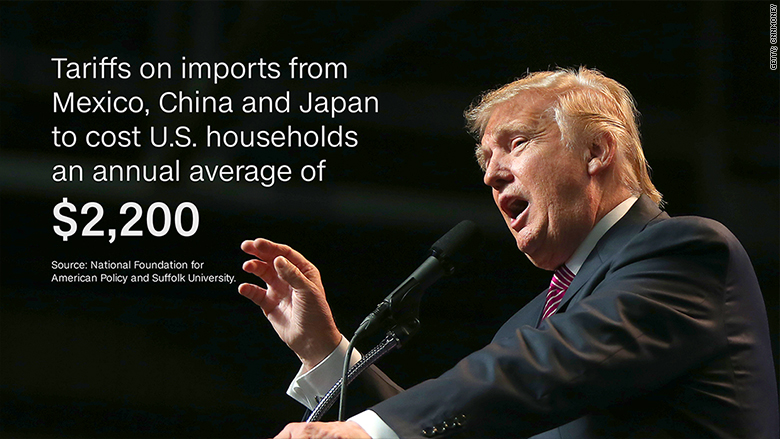G-7 To Discuss New Tariffs On Chinese Goods: What To Expect

Table of Contents
Reasons Behind Potential New Tariffs on Chinese Goods
Several key factors are driving the G7's consideration of new tariffs on Chinese goods. These range from concerns about unfair trade practices to national security risks and human rights violations.
Concerns over Unfair Trade Practices
China's alleged unfair trade practices are a major concern. These practices create an uneven playing field for businesses in G7 nations.
- Intellectual Property Theft: China has been accused of widespread intellectual property theft, costing G7 companies billions of dollars annually. This includes everything from software piracy to the forced transfer of patented technologies.
- Forced Technology Transfer: Foreign companies operating in China are often pressured to share their technology with Chinese partners as a condition of doing business. This undermines innovation and competitiveness in G7 nations.
- State Subsidies: Chinese companies often receive significant government subsidies, giving them an unfair advantage in global markets. This distorts competition and harms businesses in G7 countries.
- Examples of Affected Industries: The technology sector, including semiconductors and telecommunications, as well as manufacturing industries like steel and solar panels, are particularly affected by these practices.
- Supporting Data: Reports from the WTO and other organizations consistently highlight the scale of these unfair trade practices and their negative impact on global trade.
National Security Concerns
Certain Chinese goods are perceived as posing potential national security risks to G7 member states.
- Critical Technologies: China's dominance in the production of certain critical technologies, such as 5G telecommunications equipment and artificial intelligence, raises concerns about potential vulnerabilities in G7 national infrastructure.
- Supply Chain Dependence: The G7's reliance on China for many essential goods creates vulnerabilities. Disruptions to these supply chains could have significant consequences for national security.
- Data Security: Concerns exist regarding the security of data handled by Chinese technology companies, raising fears of espionage and data breaches.
- Diversification Strategies: Many G7 nations are now actively pursuing diversification strategies to reduce their dependence on Chinese goods and bolster supply chain resilience.
Human Rights Violations
Human rights abuses in China, particularly in Xinjiang and Hong Kong, are increasingly linked to trade policies. Tariffs could be leveraged to exert pressure for reform.
- Xinjiang's Forced Labor: Reports of forced labor in Xinjiang's cotton industry have prompted calls for sanctions and import restrictions on products made with Xinjiang cotton.
- Repression in Hong Kong: Concerns about the erosion of democratic freedoms in Hong Kong have fueled discussions about using trade policy as a tool to promote human rights.
- Impact on Specific Industries: Tariffs could target specific Chinese industries implicated in human rights violations, aiming to create financial pressure for reform.
- International Human Rights Organizations: Reports from organizations such as Human Rights Watch and Amnesty International have documented these human rights abuses and highlight the need for action.
Potential Impacts of New Tariffs
The imposition of new tariffs on Chinese goods will have far-reaching consequences, affecting G7 nations, China, and the global market.
Economic Consequences for G7 Nations
New tariffs could lead to both positive and negative economic consequences for G7 countries.
- Inflation: Increased import costs could lead to higher prices for consumers and fuel inflation.
- Sectoral Impacts: Industries heavily reliant on Chinese imports, such as consumer goods and manufacturing, will be particularly vulnerable.
- Job Market: The impact on employment will vary across sectors. Some sectors might see job losses, while others could benefit from increased domestic production.
Impact on the Chinese Economy
China’s economy would likely face significant repercussions, potentially triggering retaliatory measures.
- Economic Slowdown: New tariffs could contribute to a slowdown in Chinese economic growth.
- Export Impacts: Chinese exports and the trade balance will be negatively affected.
- Retaliatory Tariffs: China is likely to retaliate by imposing its own tariffs on G7 goods, escalating the trade war.
Global Market Implications
The broader global implications of new tariffs are significant.
- Supply Chain Disruptions: Global supply chains will likely face further disruptions, leading to uncertainty and increased costs.
- Impact on Other Countries: Countries trading heavily with China will also experience the ripple effects of the new tariffs.
- Escalation of Trade Tensions: The imposition of new tariffs could escalate trade tensions and potentially trigger a broader trade war, further destabilizing the global economy.
Alternative Solutions and Diplomacy
While tariffs might seem like a quick solution, exploring diplomatic solutions and alternatives is crucial.
Negotiation and Trade Agreements
Negotiations focused on addressing unfair trade practices without resorting to tariffs are a viable option. This involves dialogue and the establishment of fair trade agreements.
Strengthening International Cooperation
Strengthening international cooperation through existing forums and agreements is critical for addressing global economic challenges effectively.
Focus on Sustainable Trade Practices
A focus on creating a fairer and more sustainable global trade system, based on mutual respect and equitable competition, is essential for long-term stability.
Conclusion
The G7's consideration of new tariffs on Chinese goods carries significant economic and geopolitical complexities. The potential economic impacts on both G7 nations and China are substantial, with the potential for global market disruption and increased trade tensions. While addressing concerns about unfair trade practices, national security, and human rights is vital, exploring diplomatic solutions and focusing on sustainable trade practices are crucial to mitigating the negative consequences. Stay informed about the G7's decisions regarding new tariffs on Chinese goods, as these actions will significantly impact global trade and the economy. Further research into the complexities of international trade and the implications of tariffs on Chinese goods is strongly encouraged. Continue to monitor developments surrounding the G7 and its decisions on China trade to understand the evolving global economic landscape.

Featured Posts
-
 Dan Lawrence England Test Opening Spot And Future Prospects
May 23, 2025
Dan Lawrence England Test Opening Spot And Future Prospects
May 23, 2025 -
 Neal Mc Donough Sighting At Boises Acero Boards And Bottles
May 23, 2025
Neal Mc Donough Sighting At Boises Acero Boards And Bottles
May 23, 2025 -
 2025 Ncaa Tournament Bishop Englands Impact On Louisvilles Dance
May 23, 2025
2025 Ncaa Tournament Bishop Englands Impact On Louisvilles Dance
May 23, 2025 -
 Englands Winter A Champions Trophy Longing
May 23, 2025
Englands Winter A Champions Trophy Longing
May 23, 2025 -
 Upcoming Netflix Releases May 2025
May 23, 2025
Upcoming Netflix Releases May 2025
May 23, 2025
